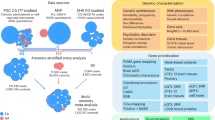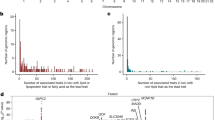Abstract
Background/objectives
Many personality traits correlate with BMI, but the existence and direction of causal links between them are unclear. If personality influences BMI, knowing this causal direction could inform weight management strategies. Knowing that BMI instead influences personality would contribute to a better understanding of the mechanisms of personality development and the possible psychological effects of weight change. We tested the existence and direction of causal links between BMI and personality.
Subjects/methods
We employed two genetically informed methods. In Mendelian randomization, allele scores were calculated to summarize genetic propensity for the personality traits neuroticism, worry, and depressive affect and used to predict BMI in an independent sample (N = 3 541). Similarly, an allele score for BMI was used to predict eating-specific and domain-general phenotypic personality scores (PPSs; aggregate scores of personality traits weighted by BMI). In a direction of causation (DoC) analysis, twin data from five countries (N = 5424) were used to assess the fit of four alternative models: PPSs influencing BMI, BMI influencing PPSs, reciprocal causation, and no causation.
Results
In Mendelian randomization, the allele score for BMI predicted domain-general (β = 0.05; 95% CI: 0.02, 0.08; P = 0.003) and eating-specific PPS (β = 0.06; 95% CI: 0.03, 0.09; P < 0.001). The allele score for worry also predicted BMI (β = −0.05; 95% CI: −0.08, −0.02; P < 0.001), while those for neuroticism and depressive affect did not (P ≥ 0.459). In DoC, BMI similarly predicted domain-general (β = 0.21; 95% CI:, 0.18, 0.24; P < 0.001) and eating-specific personality traits (β = 0.19; 95% CI:, 0.16, 0.22; P < 0.001), suggesting causality from BMI to personality traits. In exploratory analyses, links between BMI and domain-general personality traits appeared reciprocal for higher-weight individuals (BMI > ~25).
Conclusions
Although both genetic analyses suggested an influence of BMI on personality traits, it is not yet known if weight management interventions could influence personality. Personality traits may influence BMI in turn, but effects in this direction appeared weaker.
This is a preview of subscription content, access via your institution
Access options
Subscribe to this journal
Receive 12 print issues and online access
$259.00 per year
only $21.58 per issue
Buy this article
- Purchase on Springer Link
- Instant access to full article PDF
Prices may be subject to local taxes which are calculated during checkout


Similar content being viewed by others
Code availability
Code for the analyses is available at https://osf.io/meqxn/.
References
Tremmel M, Gerdtham U-G, Nilsson PM, Saha S. Economic burden of obesity: a systematic literature review. Environ Res Public Health. 2017;14:435.
The GBD 2015 Obesity Collaborators.Health effects of overweight and obesity in 195 countries over 25 years. N Engl J Med. 2017;377:13–27.
Jokela M, Hintsanen M, Hakulinen C, Batty GD, Nabi H, Singh-Manoux A, et al. Association of personality with the development and persistence of obesity: a meta-analysis based on individual-participant data. Obes Rev. 2013;14:315–23.
Davey Smith G, Holmes MV, Davies NM, Ebrahim S. Mendel’s laws, Mendelian randomization and causal inference in observational data: substantive and nomenclatural issues. Eur J Epidemiol. 2020;35:99–111.
Friedman HS. Neuroticism and health as individuals age. Person Disord Theory Res. Treat. 2019;10:25–32.
Widiger TA. Personality and psychopathology. World Psychiatry. 2011;10:103–106.
Roberts BW, Kuncel NR, Shiner R, Caspi A, Goldberg LR. The power of personality: the comparative validity of personality traits, socioeconomic status, and cognitive ability for predicting important life outcomes. Perspect Psychol Sci. 2007;2:313–45.
Murray AL, Booth T. Personality and physical health. Curr Opin Psychol. 2015;5:50–55.
Bleidorn W, Hill PL, Back MD, Denissen JJA, Hennecke M, Hopwood CJ, et al. The policy relevance of personality traits. Am Psychol. 2019;74:1056–67.
Gerlach G, Herpertz S, Loeber S. Personality traits and obesity: a systematic review. Obes Rev. 2015;16:32–63.
McCrae RR. A more nuanced view of reliability: specificity in the trait hierarchy. Pers Soc Psychol Rev. 2015;19:97–112.
Mõttus R. Towards more rigorous personality trait-outcome research. Eur J Pers. 2016;30:292–303.
Vainik U, Dagher A, Realo A, Colodro-Conde L, Mortensen EL, Jang K, et al. Personality-obesity associations are driven by narrow traits: a meta-analysis. Obes Rev. 2019;20:1121–31.
Armon G, Melamed S, Shirom A, Shapira I, Berliner S. Personality traits and body weight measures: concurrent and across-time associations. Eur J Pers. 2013;27:398–408.
Hampson SE, Edmonds GW, Goldberg LR, Dubanoski JP, Hillier TA. A life-span behavioral mechanism relating childhood conscientiousness to adult clinical health. Health Psychol. 2015;34:887–95.
Lahti M, Räikkönen K, Lemola S, Lahti J, Heinonen K, Kajantie E, et al. Trajectories of physical growth and personality dimensions of the Five-Factor Model. J Pers Soc Psychol. 2013;105:154–69.
Bordignon S, Aparício MJG, Bertoletti J, Trentini CM. Personality characteristics and bariatric surgery outcomes: a systematic review. Trends Psychiatry Psychother. 2017;39:124–34.
Pingault J-B, O’Reilly PF, Schoeler T, Ploubidis GB, Rijsdijk F, Dudbridge F. Using genetic data to strengthen causal inference in observational research. Nat Rev Genet. 2018;19:566–80.
Lawlor DA, Tilling K, Smith G. Triangulation in aetiological epidemiology. Int J Epidemiol. 2016;45:1866–86.
Briley DA, Livengood J, Derringer J. Behaviour genetic frameworks of causal reasoning for personality psychology. Eur J Pers. 2018;32:202–20.
Haycock PC, Burgess S, Wade KH, Bowden J, Relton C, Davey Smith G. Best (but oft-forgotten) practices: the design, analysis, and interpretation of Mendelian randomization studies. Am J Clin Nutr. 2016;103:965–78.
Lawlor DA, Harbord RM, Tybjaerg-Hansen A, Palmer TM, Zacho J, Benn M, et al. Using genetic loci to understand the relationship between adiposity and psychological distress: A Mendelian Randomization study in the Copenhagen General Population Study of 53,221 adults. J Intern Med. 2011;269:525–37.
Wootton RE, Lawn RB, Millard LAC, Davies NM, Taylor AE, Munafò MR. et al. Evaluation of the causal effects between subjective well being and cardiometabolic health: Mendelian randomisation study. BMJ. 2018;362:k3788.
Martins-Silva T, Vaz J, dos S, Hutz MH, Salatino-Oliveira A, Genro JP, et al. Assessing causality in the association between attention-deficit/hyperactivity disorder and obesity: a Mendelian randomization study. Int J Obes. 2019;43:2500–2508.
Chabris CF, Lee JJ, Benjamin DJ, Beauchamp JP, Glaeser EL, Borst G, et al. Why it is hard to find genes associated with social science traits: theoretical and empirical considerations. Am J Public Health. 2013;103:S152–S166.
Locke AE, Kahali B, Berndt SI, Justice AE, Pers TH, Day FR, et al. Genetic studies of body mass index yield new insights for obesity biology. Nature. 2015;518:197–206.
Nagel M, Watanabe K, Stringer S, Posthuma D, van der Sluis S. Item-level analyses reveal genetic heterogeneity in neuroticism. Nat Commun. 2018;9:905.
Heath AC, Kessler RC, Neale MC, Hewitt JK, Eaves LJ, Kendler KS. Testing hypotheses about direction of causation using cross-sectional family data. Behav Genet. 1993;23:29–50.
Leitsalu L, Haller T, Esko T, Tammesoo M-L, Alavere H, Snieder H, et al. Cohort profile: Estonian Biobank of the Estonian Genome Center, University of Tartu. Int J Epidemiol. 2015;44:1137–47.
Reile R, Tekkel M, Veideman T. Eesti täiskasvanud rahvastiku tervisekäitumise uuring 2018 [Health Behaviour among Estonian Adult Population 2018]. National Institute for Health Development; 2019.
Costa PT, McCrae RR. Revised NEO personality inventory (NEO PI-R) and NEO five-factor inventory (NEO-FFI): Professional manual. Psychological Assessment Resources, Inc; 1992.
McCrae RR, Costa PT Jr., Martin TA. The NEO-PI-3: a more readable revised NEO Personality Inventory. J Pers Assess. 2005;84:261–70.
Vainik U, Neseliler S, Konstabel K, Fellows LK, Dagher A. Eating traits questionnaires as a continuum of a single concept. Uncontrolled eating. Appetite. 2015;90:229–39.
Yarkoni T, Westfall J. Choosing prediction over explanation in psychology: lessons from machine learning. Perspect Psychol Sci. 2017;12:1100–22.
Hemani G, Zheng J, Elsworth B, Wade KH, Haberland V, Baird D, et al. The MR-Base platform supports systematic causal inference across the human phenome. eLife. 2018;7:e34408.
Eysenck SBG, Eysenck HJ, Barrett P. A revised version of the psychoticism scale. Pers Indiv Dif. 1985;6:21–29.
Draycott SG, Kline P. The big three or the big five - the EPQ-R vs the NEO-PI: a research note, replication and elaboration. Pers Indiv Dif. 1995;18:801–804.
Lo M-T, Hinds DA, Tung JY, Franz C, Fan C-C, Wang Y, et al. Genome-wide analyses for personality traits identify six genomic loci and show correlations with psychiatric disorders. Nat Genet. 2017;49:152–156.
Davies NM, Holmes MV, Smith GD. Reading Mendelian randomisation studies: a guide, glossary, and checklist for clinicians. BMJ. 2018;362:k601.
Muthén LK, Muthén B. Mplus. The comprehensive modelling program for applied researchers: User’s guide. (Los Angeles, CA: Muthén & Muthén. 2016).
Hu L-T, Bentler PM. Cutoff criteria for fit indexes in covariance structure analysis: conventional criteria versus new alternatives. Struct Equ Modeling. 1999;6:1–55.
MacCallum RC, Browne MW, Sugawara HM. Power analysis and determination of sample size for covariance structure modeling. Psychol Methods. 1996;1:130–49.
Burnham KP, Anderson DR. Multimodel inference: understanding AIC and BIC in model selection. Sociol Method Res. 2004;33:261–304.
Rasmussen SHR, Ludeke S, Hjelmborg JVB. A major limitation of the direction of causation model: non-shared environmental confounding. Twin Res Hum Genet. 2019;22:14–26.
Henry S, Mõttus R Traits versus adaptations: examining item-level characteristics of the five-factor model of personality. 2018. https://osf.io/3cebh/ (Accessed 9 Feb 2020).
Leatherdale ST, Laxer RE. Reliability and validity of the weight status and dietary intake measures in the COMPASS questionnaire: Are the self-reported measures of body mass index (BMI) and Canada’s food guide servings robust? Int J Behav Nutr Phys Act. 2013;10:42.
Briley DA, Harden KP, Bates TC, Tucker-Drob EM. Nonparametric estimates of gene environment interaction using local structural equation modeling. Behav Genet. 2015;45:581–96.
Blundell JE, Gibbons C, Beaulieu K, Casanova N, Duarte C, Finlayson G, et al. The drive to eat in homo sapiens: Energy expenditure drives energy intake. Physiol Behav. 2020;219:112846.
Vainik U, García-García I, Dagher A. Uncontrolled eating: a unifying heritable trait linked with obesity, overeating, personality and the brain. European Journal of Neuroscience. 2019;50:2430–45.
Hudson NW, Roberts BW. Goals to change personality traits: concurrent links between personality traits, daily behavior, and goals to change oneself. J Res Pers. 2014;53:68–83.
Millard LAC, Davies NM, Tilling K, Gaunt TR, Davey Smith G. Searching for the causal effects of body mass index in over 300 000 participants in UK Biobank, using Mendelian randomization. PLoS Genet. 2019;15:e1007951.
Weiss A, Deary IJ. A new look at neuroticism: should we worry so much about worrying? Curr Dir Psychol Sci. 2020;29:92–101.
Emery RL, Levine MD. Questionnaire and behavioral task measures of impulsivity are differentially associated with body mass index: a comprehensive meta-analysis. Psychol Bull. 2017;143:868–902.
Turkheimer E, Pettersson E, Horn EE. A phenotypic null hypothesis for the genetics of personality. Annu Rev Psychol. 2014;65:515–40.
Denissen JJA, Luhmann M, Chung JM, Bleidorn W. Transactions between life events and personality traits across the adult lifespan. J Pers Soc Psychol. 2019;116:612–33.
Silventoinen K, Jelenkovic A, Sund R, Yokoyama Y, Hur YM, Cozen W, et al. Differences in genetic and environmental variation in adult BMI by sex, age, time period, and region: an individual-based pooled analysis of 40 twin cohorts. Am J Clin Nutr. 2017;106:457–66.
Schrempft S, Jaarsveld CHM, van, Fisher A, Herle M, Smith AD, Fildes A, et al. Variation in the heritability of child body mass index by obesogenic home environment. JAMA Pediatr. 2018;172:1153–60.
Horn EE, Turkheimer E, Strachan E, Duncan GE. Behavioral and environmental modification of the genetic influence on body mass index: a twin study. Behav Genet. 2015;45:409–26.
Levallius J, Clinton D, Bäckström M, Norring C. Who do you think you are? - Personality in eating disordered patients. J Eat Disord. 2015;3:3.
Hudson NW, Fraley RC. Changing for the better? Longitudinal associations between volitional personality change and psychological well-being. Pers Soc Psychol Bull. 2016;42:603–15.
Acknowledgements
UV has been funded by Estonian Research Council grant MOBTP94. Supplementary information is available at International Journal of Obesity’s website and at https://osf.io/preprints/nutrixiv/q8ehr/.
Author information
Authors and Affiliations
Corresponding author
Ethics declarations
Competing interests
The authors declare no competing interests.
Additional information
Publisher’s note Springer Nature remains neutral with regard to jurisdictional claims in published maps and institutional affiliations.
Supplementary information
Rights and permissions
About this article
Cite this article
Arumäe, K., Briley, D., Colodro-Conde, L. et al. Two genetic analyses to elucidate causality between body mass index and personality. Int J Obes 45, 2244–2251 (2021). https://doi.org/10.1038/s41366-021-00885-4
Received:
Revised:
Accepted:
Published:
Issue Date:
DOI: https://doi.org/10.1038/s41366-021-00885-4



